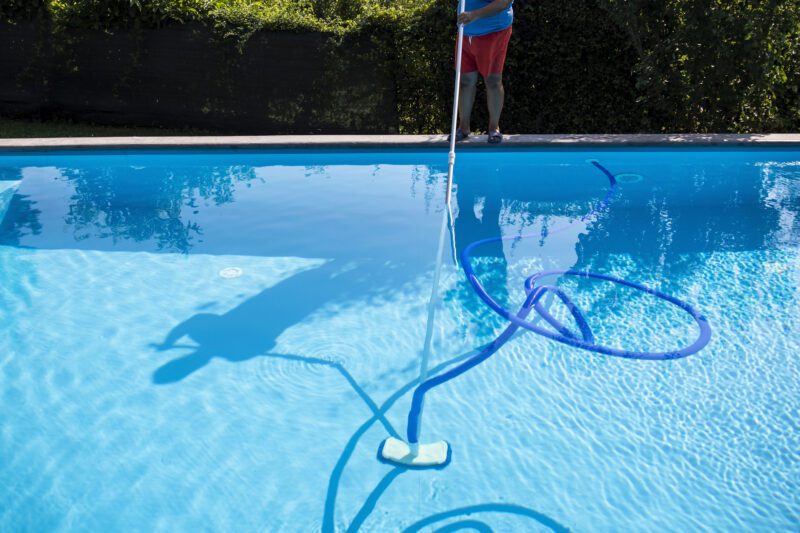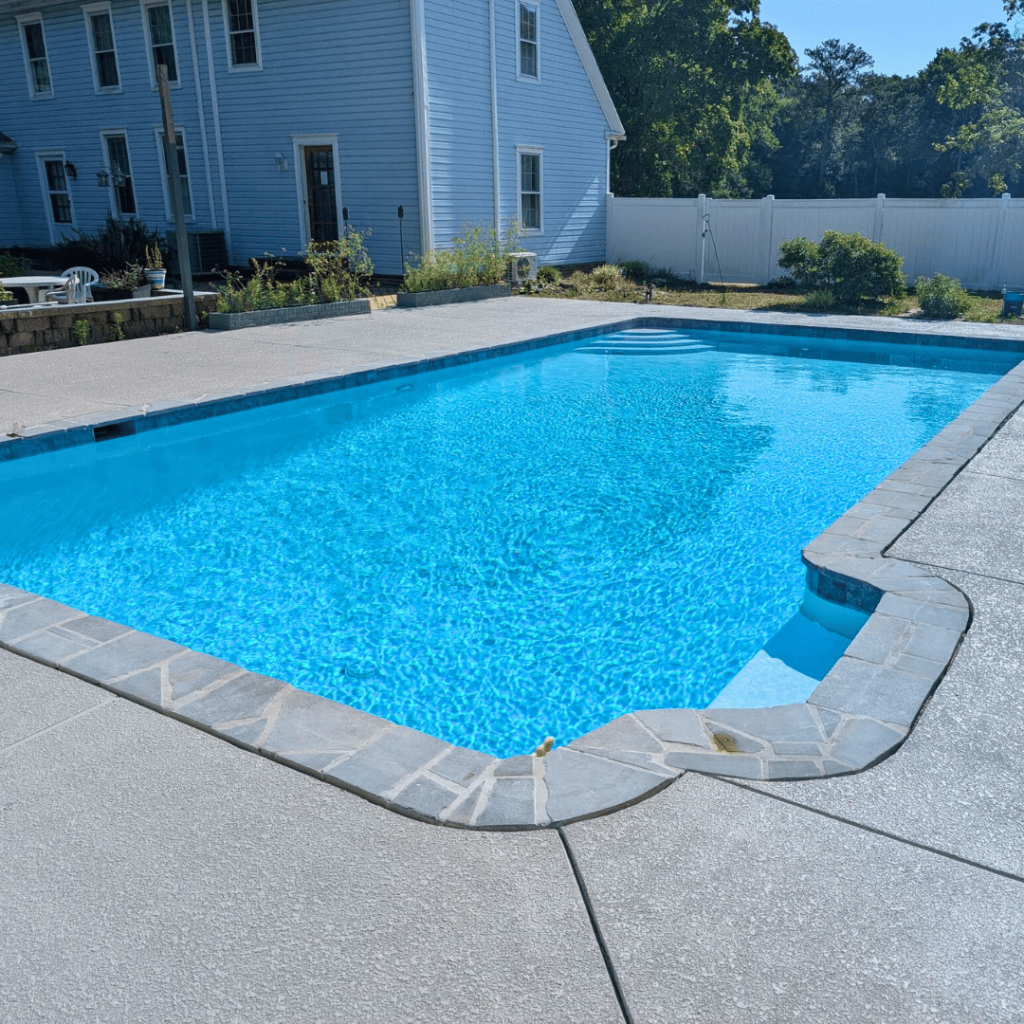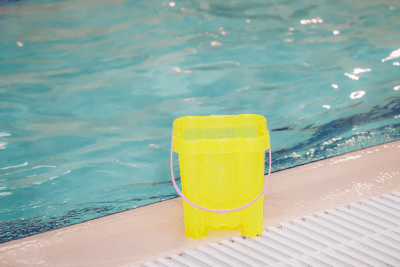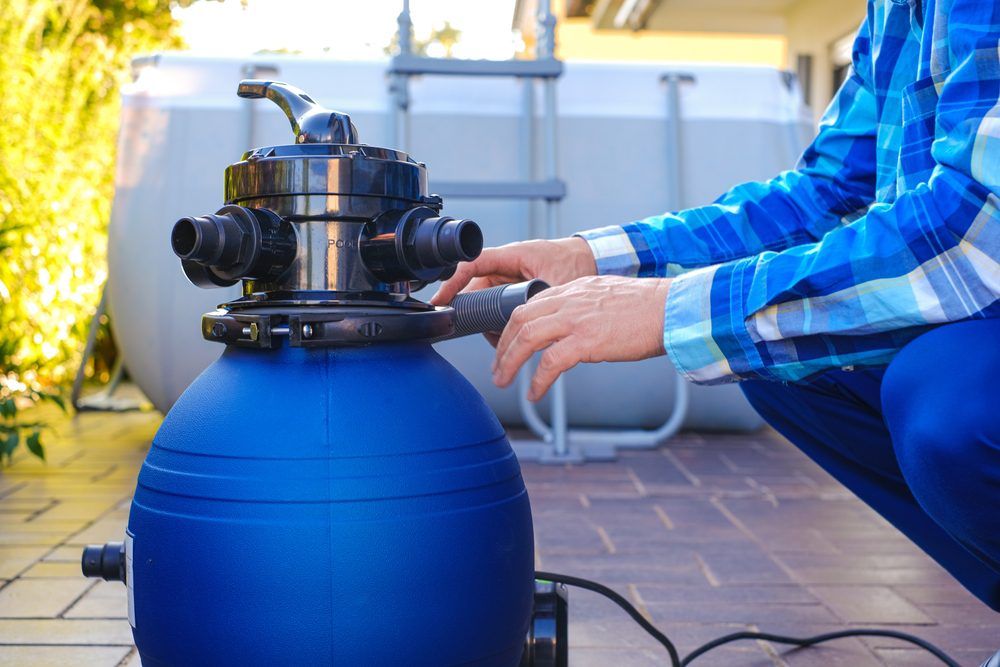How to Clean a Pool: A Guide to Swimming Pool Maintenance

To clean a pool, you should: These steps form the foundation of a clean, healthy pool. Knowing when and how to clean a pool can make a big difference, especially if you want to avoid costly problems down the road. Below, we will break each step down with practical tips and insights to help you maintain clarity, safety, and sparkle all season long. Pool Cleaning Steps: A Detailed Plan Keeping your pool clean doesn’t have to be an overwhelming chore. Whether you’re looking for DIY tips or a professional pool cleaning service, here are the detailed steps of how to clean a pool effectively. 1. Skim the Surface Use a pool skimmer net to remove debris like leaves, insects, and other floating particles that accumulate on the water’s surface. This daily habit prevents buildup and keeps your pool inviting. 2. Brush the Walls and Steps Algae and bacteria love to hide on pool walls, stairs, and corners. Use a stiff-bristled pool brush at least once a week to scrub away invisible grime and keep surfaces smooth and sanitary. 3. Vacuum the Pool Floor Dirt and sediment settle at the bottom of the pool. Pool vacuums are designed to remove what has settled at the bottom without draining the pool. Vacuuming weekly—with a manual or automatic vacuum—helps preserve water clarity and reduces strain on your filter. 4. Clean the Filter The filter is your pool’s first line of defense. Follow the manufacturer’s instructions to rinse, clean, or backwash your filter every 4–6 weeks. A dirty filter can lead to cloudy water and circulation issues. 5. Test and Balance Pool Chemicals Healthy water starts with proper water chemistry. Use test strips or digital water testers to monitor: Adjust as needed using chlorine, pH increasers or reducers, alkalinity balancers, and shock treatments. You can also look into the possibility of using bromine instead of chlorine as your sanitizer. What Do You Need to Clean a Pool? A successful pool cleaning routine requires the right tools and products. Here’s a basic list: These tools will help you handle routine maintenance and address most minor issues before they become major repairs. Common Pool Cleaning Issues and How to Solve Them Even with a good routine, problems can pop up. Here’s how to tackle some of the most common pool care challenges: Algae Growth Green, yellow, or black algae can appear on walls and surfaces, especially if chlorine levels drop. Treat immediately with an algaecide and a chlorine shock treatment, then brush thoroughly. Cloudy Water This is often a sign of poor filtration, imbalanced chemicals, or high bather load. Check and clean the filter, shock the water, and retest pH and chlorine levels. Equipment Malfunctions Reduced water flow, strange noises, or cloudy water can point to filter, pump, or skimmer problems. If you’re unsure what’s wrong, schedule a professional maintenance visit with Coastal Pools. How Often Should You Clean Your Pool? Like any well-loved space, your pool thrives with a little routine care. Consistency is key. Staying on schedule not only preserves the beauty of your pool but also extends the life of your equipment and keeps swimmers safe. Here’s a simple breakdown of how often each task should be done: Seasonal milestones like pool opening or closing may require deeper cleaning and chemical balancing. How Long Does It Take to Clean a Pool? The time it takes to clean a pool depends on its size and the tasks involved. Professional cleaning can save time and ensure everything is done right—especially for larger pools or owners who want peace of mind. How Much Does Pool Cleaning Cost? Professional pool cleaning services vary in price depending on your pool size and location. You can get a free quote for maintenance from the expert team at Coastal Pools. We offer comprehensive pool cleaning services throughout Maryland and Delaware, making it easy to keep your pool in pristine condition. Why Choose Coastal Pools Coastal Pools has designed, built, and maintained pools across Maryland and Delaware for over a decade. We use the finest materials and employ skilled professionals, ensuring every project meets the highest standards, from design to completion. We serve both residential and commercial clients, tailoring unique pool designs and maintenance to their specific needs. Let Coastal Pools handle the hard work so you can focus on making memories. Whether you need regular maintenance or want expert guidance on how to clean a pool effectively, our team is here to help. Schedule a professional cleaning or stop by one of our offices in Maryland or Delaware today.
Pool Sanitizer Bromine VS Chlorine: Which Should You Use?

When it comes to keeping your pool water clean and safe, chlorine and bromine are two of the most common sanitizers people rely on. But what’s the difference between the two, and which one is better for your pool? Bromine vs. Chlorine At first glance, chlorine and bromine might seem similar—they’re both halogens, they both kill bacteria, and they’re both used to keep pool water clean. But they have some important differences in how they work and the benefits they offer. Chlorine is a powerful disinfectant that’s been the go-to choice for decades. It works quickly to kill bacteria and other harmful organisms in the water. Chlorine comes in various forms, like liquid, tablets, or granules, and it’s relatively easy to use and manage. Bromine, on the other hand, is often the choice for hot tubs and indoor pools because it holds up better in warm water. It’s also less harsh on the skin and eyes compared to chlorine, making it a popular option for people with sensitive skin. Difference Between Bromine and Chlorine The biggest difference between bromine and chlorine lies in their behavior in water. Chlorine is known for being fast-acting—it quickly kills off contaminants, but it also dissipates faster, especially under direct sunlight. That means you might need to add chlorine to your pool more frequently to maintain proper levels. Bromine, however, acts a bit slower. It takes longer to kill bacteria and other microorganisms, but once it’s in the water, it tends to stay active for longer periods. This makes bromine more stable and effective over time, especially in warmer environments where chlorine might evaporate too quickly. Another key difference is the byproducts they produce. Chlorine can leave behind chloramines, which are responsible for that strong “pool smell” and can cause irritation to your skin and eyes. Bromine produces bromamines, which are much less irritating and don’t have that strong odor. What Does Bromine Do in a Pool? Bromine works similarly to chlorine in that it sanitizes your pool by attacking and neutralizing bacteria, viruses, and other harmful organisms. It’s particularly effective in warmer water, which is why you’ll often see it used in hot tubs or heated indoor pools. One of the main benefits of bromine is that it continues to work even after it neutralizes contaminants. Instead of becoming useless like chlorine does, bromine can be “reactivated” with a shock treatment, meaning you’ll get more mileage out of it before needing to add more. However, bromine does have a few downsides. It’s generally more expensive than chlorine, and it can be a bit harder to find in stores. Also, while it’s more stable in sunlight compared to chlorine, it still breaks down faster when exposed to UV rays, so it’s not ideal for outdoor pools unless you’re willing to use stabilizers or cover your pool when it’s not in use. Is Bromine Better Than Chlorine? So, is bromine better than chlorine? The answer depends on your specific needs and pool conditions. If you have an outdoor pool that gets a lot of direct sunlight, chlorine might be the better choice because it’s more cost-effective and easier to manage in these conditions. Plus, with proper stabilizers, you can reduce how quickly it breaks down in the sun. On the other hand, if you have a hot tub, heated indoor pool, or you’re sensitive to chlorine’s effects, bromine could be the better option. It’s gentler on your skin and eyes, lasts longer in warm water, and doesn’t produce that strong chlorine smell. In the end, both chlorine and bromine have their pros and cons. The best choice for you depends on factors like the type of pool or spa you have, your budget, and your personal preferences. Call Coastal Pools If you need help deciding what chemicals and treatments to use in your pool and spa, contact the professionals at Coastal Pools. Whether your pool needs seasonal opening or closing, cleaning, or ongoing maintenance, we are standing by to provide what it takes to make your pool shine for years to come. With years of experience servicing the greater Maryland and Delaware area, we are a partner you can trust. Contact us today!
How to Find and Fix a Pool Leak

Owning a pool is a dream come true – until you notice the water level dropping faster than it should. While some water loss is normal due to evaporation, a significant decrease might signal a pool leak. Here’s how you can find and repair that pesky leak, so you can get back to enjoying your pool. How to Tell if Your Pool is Leaking Before jumping into pool leak detection and repair, confirm that your pool is leaking. Here are a few signs to look out for: How to Find a Pool Leak Once you’ve determined your pool is leaking, it’s time to find out where. Here’s a simple step-by-step process to find the source of the leak: How to Fix a Pool Leak Here’s how to fix a pool leak, depending on where it’s located: Call Coastal Pools While some pool leak repairs are DIY-friendly, others might require professional help. If you can’t locate the leak, if it’s in the underground plumbing, or if the damage is extensive, call in a pool repair expert. Coastal Pools has the equipment and expertise to get your pool back in shape.
How Long Do Pool Filters Last?: Types of Pool Filters

How Long Do Pool Filters Last?The Importance of Pool Filters For pool owners, maintaining clean and clear water is vital, and much of this responsibility falls on the pool filter. But one of the most common questions new and experienced pool owners alike ask is: “How long do pool filters last?” Understanding the lifespan of your pool filter and its components, such as sand and cartridges, is crucial to keeping your swimming pool in top condition. Lifespan of Pool Filters The lifespan of pool filters depends on several factors including the type of filter, usage, maintenance, and pool size. Generally, pool filters can last between 3 to 7 years. However, this can vary significantly based on how well the filter is maintained and the type of filter you are using. Types of Pool Filters and Their Maintenance There are three main types of pool filters: sand, cartridge, and diatomaceous earth (DE). Each type requires different maintenance routines which can affect their overall lifespan. Sand Filters Sand filters have become popular for their simplicity and effectiveness. They filter out debris and impurities by allowing pool water to pass through a bed of sand. But, how often should you change the sand in your pool filter? Typically, it’s recommended to replace the sand every 7 to 10 years. This ensures the filter remains effective, as over time, the sand becomes smooth and less efficient at trapping particles. The sand filter tanks usually last between 7 and 20 years. Cartridge Filters Cartridge filters use a paper-like material to trap debris in the water. These filters are favored for their ease of maintenance and higher efficiency. How often to clean the pool filter if you’re using cartridges? It’s advisable to clean the cartridges every few weeks or as needed depending on pool usage and load of impurities. A deep clean should be done every 3 to 6 months, and the cartridge filter elements usually need replacing every 3-5 years depending on the conditions they’re subjected to. The cartridge filter itself usually lasts 15-20 years. Diatomaceous Earth (DE) Filters DE filters provide the highest level of filtration by using a natural substance called diatomaceous earth. DE filters are capable of filtering out much smaller particles than sand or cartridge filters. Like sand filters, DE requires backwashing and the DE medium itself should be replenished after every backwash. Typically, a complete change of DE is necessary every year, with frequent backwashing and replenishment of the earth after each backwashing. How Often to Replace a Pool Filter Even with diligent cleaning and maintenance, eventually, the physical parts of the filter will degrade and require replacement. How often to replace a pool filter entirely depends on the condition of the filter and the type. As a rule of thumb, carefully inspect your filter’s condition during routine cleanings and consult with a professional to assess whether a replacement is necessary. It is typical to expect to start replacing parts on a filter at the 10 year mark, and expect filters that are between 15-20 years old to potentially need to be replaced completely. Routine Maintenance is Key Maintaining your pool filter is crucial to ensuring your pool remains a clean, enjoyable space. By understanding the maintenance needs of your filter type, you can significantly extend its lifespan and improve its efficiency. Regular cleaning, timely replacement of sand or cartridges, and an occasional full filter replacement will help you keep your pool in pristine condition year after year. Service Your Pool with Coastal Pools Maintain your pool equipment and filter with Coastal Pools! Coastal Pools is here for you with our team of expert technicians. Experience a tailored approach to pool service and lifelong care in Maryland or Delaware. Contact us online or at 410-827-0888 today and let’s build your dream oasis together.



